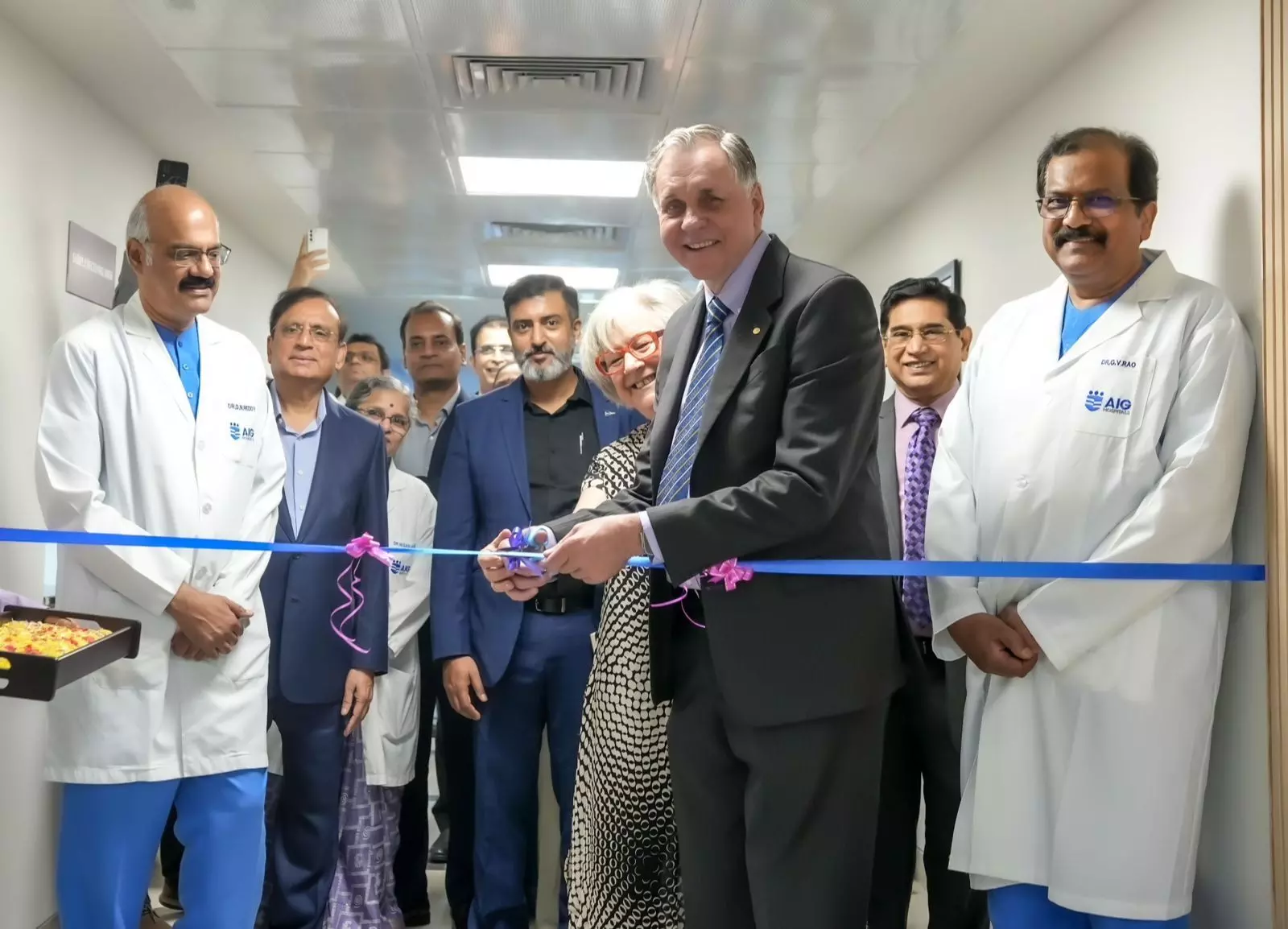AIG Hospitals launches Barry Marshall Centre in Hyderabad for researching H. Pylori infections, treatment
The Barry Marshall Centre will establish improved diagnostic protocols, particularly for individuals over 50 who experience symptoms such as persistent stomach pain or digestive issues
By Newsmeter Network
AIG Hospitals launches Barry Marshall Centre in Hyderabad
Hyderabad: A new centre by AIG Hospitals dedicated to researching Helicobacter Pylori (H. Pylori) infections and developing tailored treatments has been launched in Hyderabad, marking India’s first facility of its kind.
Named after Nobel Laureate Prof Barry Marshall, who co-discovered the role of H. Pylori in causing peptic ulcers, the Barry Marshall Centre for H. Pylori Research aims to reduce stomach cancer rates in India through advanced diagnostics and treatments.
Rising health concerns from H. Pylori in India
Dr D Nageshwar Reddy, chairman and chief of Gastroenterology at AIG Hospitals, emphasised the high prevalence of H. Pylori infections in India, affecting an estimated 50-60 per cent of the population.
“This is almost 10 times more than the incidence of diabetes in our country,” he explained. “H. Pylori is the leading cause of chronic gastritis, peptic ulcers and stomach cancer, and has been classified as a Group I carcinogen by the WHO. Due to the high rates of stomach cancer in India attributed to this infection, targeted research and intervention are critical.”
Customised approach for India’s unique strains
The research at the Barry Marshall Centre will focus on genetic characteristics specific to H. Pylori strains in India, which require distinct treatment approaches.
“Our research is particularly focused on how genetic differences in India’s H. pylori strains affect treatment efficacy,” Dr Reddy shared. “Through understanding these variations, we can enhance the precision of our treatments, offering patients a more effective pathway to recovery.”
Dr Reddy also pointed to the centre’s commitment to addressing antimicrobial resistance in H. Pylori, a growing challenge that complicates treatment.
“Our centre will be at the forefront of research in this area, devising individualised treatment strategies for drug-resistant H. Pylori strains. We need to prioritise diagnostics that help us understand each patient’s resistance profile, allowing us to select the most effective, targeted therapies,” he added.
Advanced diagnostic protocols
The Barry Marshall Centre will establish improved diagnostic protocols, particularly for individuals over 50 who experience symptoms such as persistent stomach pain or digestive issues.
“For these cases, endoscopy, along with non-invasive diagnostic tools like urea breath tests, stool antigen tests, and serology, will be recommended as first-line options,” said Dr Reddy. He noted that these tests offer high accuracy without invasive procedures, and that non-invasive testing would also be available for asymptomatic individuals at higher risk of complications.
Prof. Marshall’s vision for H. Pylori treatment in India
Prof. Barry Marshall, present at the inauguration, underscored the importance of a tailored strategy in India due to its high H. Pylori prevalence. “India’s high H. Pylori prevalence calls for a robust research and treatment strategy,” he stated. “The Barry Marshall Centre signifies a step forward in H. Pylori management. By focusing on prevention as well as treatment, we’re hopeful that stomach cancer rates in India will diminish significantly.”
Dr Reddy echoed this vision, saying, “Our mission is to build a healthcare model that not only treats but prevents H. Pylori infections, eventually leading to the eradication of H. Pylori and a healthy stomach for all Indians. Prof. Marshall’s involvement brings a unique depth to our work, and together, we aim to set a new benchmark for H. Pylori management in India.”
Guidelines and national outreach
The centre’s treatment guidelines will follow a test-and-treat strategy for both symptomatic and asymptomatic high-risk individuals, with personalised protocols to address antibiotic resistance and genetic variability.
“Our approach will combine these guidelines with personalised strategies based on our research findings, particularly in addressing resistance and genetic variability in India’s H. Pylori strains,” Dr Reddy said.
Collaborative efforts and future directions
Following the inauguration, Prof. Marshall engaged in a round-table discussion with top gastroenterologists and researchers from across India to outline a comprehensive approach to H. Pylori management.
The two-pronged approach discussed included:
1. Test and Treat: Identifying and treating H. Pylori-positive individuals in the community, particularly those with gastrointestinal symptoms.
2. Scope and Treat: Using advanced endoscopic and non-invasive techniques to diagnose and treat symptomatic individuals at risk of severe H. Pylori-related diseases.
The centre aims to establish a scalable model for H. Pylori management, contributing to a framework for nationwide eradication efforts. It will also educate the public on the importance of early testing and treatment adherence to curb the incidence of H. Pylori-related stomach cancer.
Prof. Marshall is also set to deliver the Dr D Nageshwar Reddy Endowment Oration on his discovery of H. Pylori at the upcoming IMA TGCON conference, further emphasising the commitment to addressing H. Pylori challenges in India.